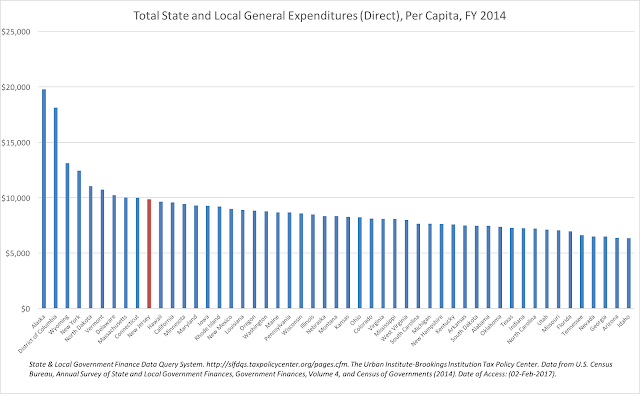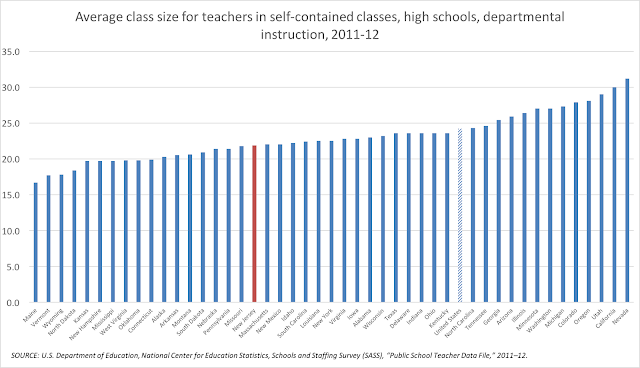Jersey Jazzman: Blaming Public Employees for NJ's Fiscal Mess: Today's Dopey Episode
Whenever I want to read something really ill-informed and contemptuous of public employees, I turn to the always reliable Star-Ledger:
Property taxes in New Jersey are the highest in the nation. Since 2000, they have doubled and have risen at over twice the rate of inflation. No wonder people are forced to move; no wonder we have the highest foreclosure rate in the nation.
That's from guest columnist Tom Byrne, who apparently is so busy with his gig on the State Investment Council that he doesn't have the time to find out that out-migration due to taxes is a totally fabricated myth.
Or the time to read the Star-Ledger itself (the news part, which is still pretty good), which pointed out that New Jersey's high foreclosure rate is due, at least in part, to the state's relatively long foreclosure process.
By the way -- New Jersey is not some sort of wildly high-spending state:

OK, we're top ten (barely), but we're not some sort of outlier -- and that's without accounting for the fact that this is an expensive state in which to live. Funny how stuff like this never made it into Byrne's piece:
The obvious way to control property taxes is to hold the line on expenses, but this is fraught with political consequences, especially for Democrats. Public-sector unions like the NJEA and the two police unions, whose members' salaries and benefits are largely paid by property taxes, wield enormous influence in both general elections and, particularly, Democratic primaries.
Yes, it's those greedy, greedy NJ public employees...
The data analysis in this paper, however, indicates that New Jersey public employees, both state and local government employees, are not overpaid. Comparisons controlling for education, experience, hours of work, organizational size, gender, race, ethnicity, and disability reveal no significant difference between the private and public sectors in the level of employee compensation costs on a per hour basis. However, public employees, particularly higher level professional employees, have fewer opportunities to work overtime than those who work in the private sector. Therefore, on an annual basis, full-time state and local employees are under-compensated by 5.88% in New Jersey, in comparison to otherwise similar private-sector workers. [emphasis mine]
Real research? Tl;dr. Besides, Byrne lives in the world of "alternative facts," where he can use unsourced data points to make unfounded claims:
Positive change can be made. For starters, we could cut property taxes by about 8 percent simply by insisting that local employees get the same healthcare benefits that exist at the high end of private sector plans. That alone would save about $2.5 billion on $28 billion in annual property taxes. But what politician wants to risk the wrath of the unions?
I'm not quite sure who Byrne means by "local employees," as some, like teachers, are subject to state laws regarding premium payments, and some are on state plans. But when it comes to state workers:
In fact, the average New Jersey government employee is paying more for individual health insurance coverage than government workers in any other state and the 10th-highest average premium for family coverage in the country.
Further, state and local government workers are paying a much higher percentage of the cost of their individual health insurance policies than private-sector employees in New Jersey have been paying, and not much less than the percentage paid by the state’s private-sector workers for family coverage. [emphasis mine]
Whether the insurance is "better" than private insurance is, of course, a more complicated question. But the notion that public employees are enjoying inordinately cheap health care is just not borne out by the evidence, no matter what Chris Christie's commission says. Byrne continues:
The most recent available data, from 2012-13, shows New Jersey with the highest starting teacher salaries of any state. But three states have higher average salaries than our $68,797. On top of this, data from the Bureau of Labor Statistics suggests that the value of total benefits added 29.4 percent or $28,520 to base pay for a total value of over $89,000. And then adjust as you will for a shorter work year.
First of all; even when you adjust for teachers' annual unpaid furlough every summer, teachers make less than similar workers:
New Jersey public school teachers are in fact undercompensated, not overcompensated. Using regression analysis to control for level of education and other factors that affect pay, we find that public school teachers earn 16.8 percent less in weekly wages and 12.5 percent less in weekly total compensation (wages and benefits) than other full-time workers in New Jersey. The percent by which teacher pay is less than pay of comparable workers is called the teacher pay penalty. An analysis of hourly compensation shows the teacher pay penalty at 13.7 percent for wages and 9.4 percent for total compensation. [emphasis mine]
In addition: the percentage of total compensation that is attributed to benefits is 30 percent for private employees.* So, no, benefits aren't completely out of whack for NJ public employees. In addition, Byrne makes the freshman mistake of not adjusting wages for geographical differences. His comparisons here are, in a word, worthless.
This is turning into a real mudder, but let's keep going:
It seems that the bigger issue is proliferation of non-teaching staff. There are far more vice principals and administrators than a generation ago, which has not improved education. One national study shows that the number of K-12 administrators has increased 2.3 times faster than the number of students in school. If we don't deal head-on with these issues, we will shortly be forced to increase class sizes.
No, it does not: the study, from the Friedman Foundation, shows that the combined group of administrators and "other staff" increased.
In the period between 1992 and 2009, federal special education law underwent significant changes; it was also the time when No Child Left Behind passed. Both set new high standards, so it was inevitable that schools would increase personnel (including instructional aides) to reduce class size, expand offerings, provide remediation, and improve special education programs. Money matters in schools, and the largest expense in schools is staffing.
It's also worth noting the United States does not overspend on education compared to the rest of the world when making appropriate adjustments for student characteristics and other factors.
Keep going...
I heard one deputy commissioner of education say some years ago that if we had the same class sizes as the national average, we would save over $1 billion per year.
Casual conversations with bureaucrats are not serious sources of data. Instead:

Yes, New Jersey's class sizes are smaller than the national average, especially in primary schools -- but, again, we're hardly an extreme outlier. And maybe our outstanding performance in academic outcomes owes something to putting more resources into schools and reducing class sizes.
Yes, Massachusetts spends somewhat less and does very well, but we're not Massachusetts. Our kids are different and our labor costs are different. We aren't really far behind them, and we're not wildly spending more than they are.
Regular readers know that pieces like Byrne's frustrate the hell out of me. We should be having serious conversations about fixing New Jersey's fiscal crisis. I'm all for looking at finding efficiencies in our school system: one clear way would be to stop having small, inefficient charter schools with large administrative expenses continue to proliferate.
But facile, poorly sourced fluff like Byrne's op-ed keep us from having those conversations. And one more thing:
One more administrative example. Gloria Bonilla-Santiago, who runs a well-regarded charter school in Camden, says her custodial costs are $400 per student, versus $1,200 per student for the unionized custodians in the Camden public schools. The NJEA pointedly asks gubernatorial candidates if they would do anything to change this. Not if they want to win a primary election.
Unless this is an extraordinary coincidence, Byrne gets this story wrong too. This anecdote and its specific dollar amounts are from Dale Russakoff's book, The Prize. This story is about a school in Newark; I debunk it here.
I don't know what Bonilla-Santiago told Byrne; she's quite a character herself. But maybe Tom Byrne should spend a little less time talking with her and a little more time looking at real, credible research before writing his next op-ed.
Keep those alternative facts coming, Tom!
* One of the things that makes me nuts about pieces like this is that they are unclear about how they use the term "percentage." Given the figures here, benefits didn't add 29.4 percent to base pay; benefits are 29.4 percent of total compensation. That's completely different. Didn't anyone at the S-L proofread this?
This blog post has been shared by permission from the author.
Readers wishing to comment on the content are encouraged to do so via the link to the original post.
Find the original post here:
The views expressed by the blogger are not necessarily those of NEPC.



